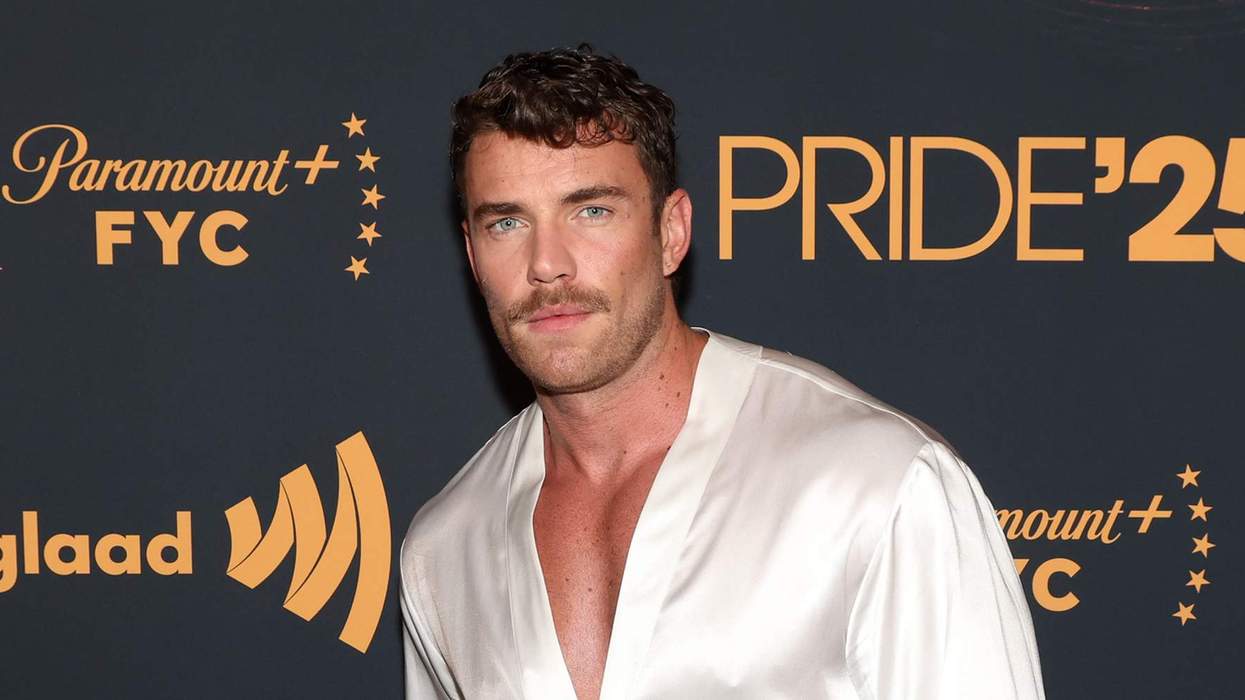Editor's Note: This review contains spoilers.
Call Me by Your Name is a first novel by Andre Aciman, about a brief affair between a 17-year-old American-Italian Jewish boy living with his parents in Italy at their vacation home, and a 24-year-old American graduate student who comes to live with the boy's family in the summer of 1987. Looking back at events from two decades, the novel is narrated by the teenage boy so we are completely in his consciousness and we are aware of everything he's thinking about and feeling--sometimes too much so. The novel, published in 2007, is fairly straightforward and earnest and sometimes reads like an oddly translated-from-another-language young adult romance--the sex is rarely described and most explicit details are muted. You might find yourself thinking that Aciman--who is married to a woman and has gone on the record to say that he has never had a homosexual relationship--is simply writing a book about desire and identity. Yet there's a peculiar distance at work here and the novel is skittish about actually describing gay sex. If Aciman had experienced sex with a man I think he would have approached these scenes differently and maybe rethink post-sex dialogue like, "I don't think I'll be able to ride my bike today." This was distracting when I first picked up this touching, readable novel, but I put it down at a certain point and didn't pick it back up again until I saw the new movie version of it ten years later.
Related | The Art of Seduction: Armie Hammer & the Hottest Movie of the Season
The movie adaptation--with no voice-over, no flashback structure--is more mysterious and elegantly episodic, looser, almost languorous, but also bracingly simple: this is not a movie concerned with plot or motivation or reveals or whammies--it's pure cinema concerned solely with mood and atmosphere. Aciman may be straight but the screenwriter who adapted the book, James Ivory, and the director, Luca Guadagnino, are gay, and the movie is joltingly sensuous and sexy in ways that the novel isn't because it's attuned to the (gay) male gaze and renders the male bodies on display with a casual erotic fervor. And the movie has moved the action to 1983 (I'm assuming so we don't have to be distracted by AIDS, though it's also never alluded to in the novel, which is set four years later) and the location has also been changed from a dramatic cliffside mansion on the Italian Riviera to the more modest villa "somewhere in Northern Italy" (a title card tells us) and Guadagnino, who specialized in a kind of upscale-travelogue porn in his last two films I Am Love and A Bigger Splash, takes advantage of both this new locale and its lack of specificity. With his cinematographer (Sayombhu Mukdeeprom) he gives the movie a dreamy, timeless quality, and since Guadagnino isn't encumbered with an overly busy plot as he was with A Bigger Splash, he can concentrate on just the magical fairy-tale setting and the two young lovers at its center, and in doing so has come up with the most romantic, swooniest movie of the year. It casts a complete and total spell.
Every summer, archaeology professor Perlman (Michael Stuhlbarg) invites a graduate student to live with him and his wife (Amira Casar) and his teenage son Elio (Timothee Chalamet) to help with academic paperwork, and this summer it's Oliver (Armie Hammer) a big handsome blond blue-eyed American who joins this upscale, Jewish, scholarly, quasi-European family where everyone smokes cigarettes and a 17 year-old can mention casually over breakfast that he almost had sex with a girl the previous night. We're not sure what's up with Elio--he's a voracious reader, a musical prodigy, speaks a few languages, and he seems straight: he has no cliched mannerisms (except a kind of forced swagger) and what seems like a girlfriend. But Oliver awakens something in him that at first Elio resents before falling into an erotic obsession--and yet we have no reason to suspect that Oliver is gay, either, except for one quick shoulder rub that Elio brushes off, mortified; and Oliver might also just be screwing another girl in town. The idyllic sun-dappled setting of the movie becomes as much of a character as the two men circling each other, drawing closer, and it encourages and helps activate their erotic desires. Neither man conforms to the way the medium has presented gay men in the past, though of course they're both beautiful because Call Me By Your Name is at heart just an unapologetic widescreen romance as well as a wistful coming-of-age story, and nothing else.
Because the constraints of society don't exist within the film's cinematic world it frees the movie from a certain kind of ideology, and Call Me By Your Name can easily be heralded as a post-gay movie because it's not about the closet or AIDS or bullying or politics or being a victim. There's no one to hide from, no punishment, no suffering (except, of course, the timeless kind)--its only ideology is about art and aesthetics, and this makes it a big progressive leap forward in gay cinema's depiction of desire. (We are a long way from the mournful Brokeback Mountain shrouded in guilt and shame and death.) No other movie before Call Me By Your Name has dealt with this on as large a scale and in such a calm, neutral and sophisticated manner. This all could have come off as terribly enlightened--the academia, the foreign locale, the references to Hellenistic sculpture--but the director and the cast sell something else and the chicness evaporates into feeling; the gorgeousness of the moviemaking erases any solemnity as do a few key period touches: Wayfarer sunglasses, Elio's Walkman, his Talking Heads t-shirt, a Mapplethorpe print, and the Psychedelic Furs 1982 hit "Love My Way" played loud at a makeshift disco and never sounding better.
The movie has a ticking clock: Oliver is only going to be around for six weeks and the tension of the movie is--as it is in every scenario like this--when are they going to have sex? The movie teases this out in a way that becomes genuinely suspenseful, and Guadagnino adds to this suspense by letting the movie breathe with close attention paid to behavioral details: glances, gestures, small slights and evasions, real and imagined, everything building. He has slowed his style down, even though the movie is quick-witted and funny, and this lack of insistence has resulted in a movie that's more fluid and expressive than anything he's done before. The sensuality might be intoxicating at times but this isn't an explicit movie--there are flashes of male (and female) nudity but Call Me By Your Name is practically PG-rated compared to something like Stranger by the Lake or Blue Is the Warmest Color. At one point the camera even discreetly pans to a window when Oliver and Elio first have sex but it's certainly invested in the bodies of the actors and it doesn't erase sex from the equation like Moonlight did, and the director's bad-boy side is blissfully intact in the now infamous scene where Elio masturbates with a peach.
Elio is withdrawn and hesitant, intelligent but not fully formed, with the studied indifference that is the essence of male adolescence. Chalamet actually looks 17, and sometimes he's strikingly beautiful (an idealized twink) and other times he looks gangly and awkward (often in the same scene) and Guadagnino doesn't hesitate to shoot him as a sex object--we are forced to experience him as that. It's an extraordinary minimalist star turn, a quiet performance of massive feeling, much like what Casey Affleck achieved in Manchester By the Sea. It's peerless--maybe the greatest portrayal of male adolescence on film. The director is exquisitely tuned-in to his leading man, deftly capturing every nuance and delicate shift in feeling, and Chalamet pushes underplaying into a realism so intense it becomes almost operatic. Chalamet is so free and his character is so lived-in that he can try anything as an actor and no matter how leftfield and unexpected his choices are it always feels right. Watching a young actor working on pure instinct and so poetically with a director giving him the freedom to do so is one of the great pleasures of watching movies.
Related | Telling Armie Hammer to 'Man Up' Isn't Going to Help Hollywood's Diversity Probl
For those of us who have been rooting for prom-king Armie Hammer ever since he played the Winklevi in The Social Network and were dismayed that he got swallowed up in movies like The Lone Ranger and The Man From U.N.C.L.E. or undirected by one-take auteur Clint Eastwood in J. Edgar, it's thrilling to finally see him perfectly cast as what he has always been: a love object. With beguiling humor Hammer effortlessly humanizes the remote fantasy stud from the novel (though a few admirers of the film have complained that the casting of Hammer is too on the nose, pointing out that James Ivory originally wanted Shia LaBeouf as Oliver but when Guadagnino came on board he thought Hammer would be a better fit). Hammer brings a pure and light-hearted low-key ambiguity to the role; his final look at Elio from a passing train is haunting because he makes us realize that this summer isn't going to affect him the way it does Elio--it might be a fling for Oliver but it's heartbreak for the teenager. Hammer gives a fearless and forcefully physical performance--the movie seems in awe of him--and there are few scenes more awkwardly glorious than when Hammer ecstatically dances to "Love My Way" in that makeshift disco.
In terms of plot nothing much happens on the surface of Call Me By Your Name but of course something monumental is happening because what we are witnessing is the erasure of innocence--this affair will kill that. On a second viewing the gay vibe from Elio's father is clearer, and in a very moving scene near the end he gives a speech to Elio, devastated over the loss of Oliver and flooded with the pangs of first love's disappointments. The speech is culled from the book where the father tells his son that he knew what was happening between him and Oliver and that he has nothing to be ashamed of and to cherish the pain he's feeling and that he'll always be there for him. This scene could have been nearly insufferable in its noble "progressive" virtue-signaling: if only we all had fathers this wonderful and warm-hearted and accommodating, who can console their sons with lines like "When you least expect it nature has cunning ways of finding our weakest spot," and "Remember, I'm here."
And yet Stuhlberg sells it with a hushed technical virtuosity that makes every word land and vibrate even though at times he overdoes the saintly Jewish-Daddy thing. Stuhlberg makes this the real climax of the movie--it becomes a primal scene--and in the packed theater I saw the movie you could hear the gay men (at least half the audience) barely holding back muffled sobs. Call Me By Your Name is the movie generations of gay men have been waiting for: the fullest, least condescending expression of gay desire yet brought to mainstream film. It ends with a nearly wordless four-minute shot of a tear-stained Chalamet staring into a fireplace, a myriad of emotions subtly morphing over his face while the credits roll and which reminds us: there cannot be love without pain, the two are intertwined and intractable, and that the boy might be destroyed but a man will emerge and survive.





























